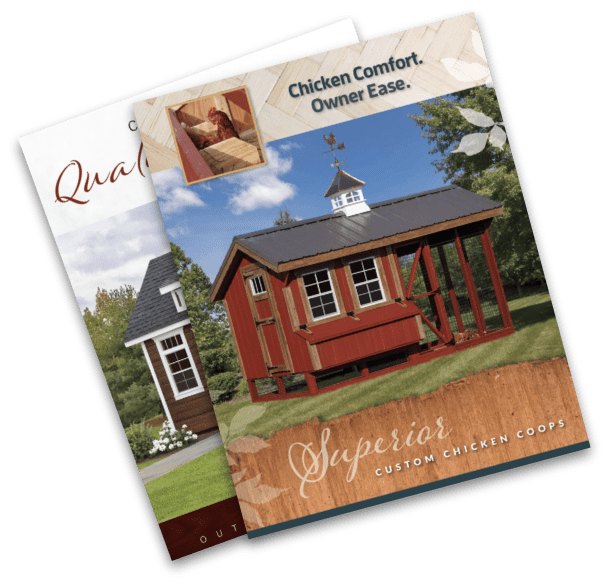Winter can be tough on backyard chickens. Less day light means less eggs and the cold and snowy weather can make simple chores seem much worse. Chickens are pretty hardy, but there are some things you can do to help them and you during the cold, dark winter months. Hopefully this will be a helpful guide for how to care for chickens during the winter.
#1 DON’T HEAT THE HENHOUSE
Chickens do better in the cold temperatures then in the really hot temperatures. After all they are fluffy and downy, and they love to huddle close on the roost bar at night. This helps keep warm. Their feathers are for trapping warm air.
Putting a heat source in your chicken coop is literally playing with fire. The straw and bedding along with the unpredictable motions of chickens is a recipe for disaster. Countless people have had their chicken coop catch fire while trying to heat it, when it is not necessary.
Another thing to consider is that chickens do not do well with extreme temperature change. So for example, if you heat your henhouse and its 65 degrees inside, but when the chickens come out into the run or field and its 12 degrees out, the sudden temperature change can be extremely harmful, if not deadly to them.
#2 BLOCK DRAFTS BUT KEEP YOUR COOP VENTILATED
You never want to completely seal off henhouse during winter. Chickens give off a lot of moisture with their breathing and their droppings. Sealing it off completely would cause problems with ammonia build up and moisture. Both can cause respiratory problems in your chickens.
You need ventilation always in the winter and summer months, in your henhouse to keep the humidity down and prevent mold in the bedding.
However, you still need to block cold drafts from coming in your coop. Drafts and moisture impair a chickens ability to maintain a dry, warm cocoon of air that they need for their well being in the winter time.
We have solved this prolbem with our polycarbonate run covers. These removable covers fit on the inside or outside of your run walls and help keep snow and cold rain out of your run and protect your flock from the elements. (If you don’t see the size you need, just contact us)
Also, their wattles and combs can be susceptible to frostbite. You can protect them with petroleum jelly or green goo, which is another great product that works for all sorts of cuts and scrapes.
#3 USE THE DEEP LITTER METHOD
All the Carolina coops incorporate the deep litter method. It allows the bedding material in the henhouse (we love the industrial hemp) and the chicken poop to build up and compost over the year.
It helps promote the beneficial microbes that are necessary for good compost (and chicken health), but it also gives off its own heat, warming the coop at night naturally.
#4 KEEP THE CHICKENS WATER FROM FREEZING
This is a huge challenge for many chicken owners. If you have electric near your coop, our heated poultry water system is really the best way. Even if your aren’t capturing water from the roof to a gutter to the rain barrel, you can still use the rain barrel for a 50 gallons or so of water on tap for your chickens.
THIS IS HOW IT WORKS
The water in the barrel is gravity fed to the waterbar. Horizonal nipples are best because they don’t drip, and the water stays clean.
When the temperature gets below freezing, a pump connected between the rain barrel and the waterbar and a paddle heater inside the barrel kicks on through a thermostatically controlled outlet.
The circulated water doesn’t freeze because its constantly moving through the waterbar back to the rain barrel.
Once the temperature gets above 39 degrees F, the thermostat shuts off.
There are also other ways to heat water with, electricity. A heated dog bowl will work and so does a heated hanging poultry fountain. Keep in mind though, it is very awkward to fill and have hang again. And with both the water will get dirty and need to be cleaned often.
If you don’t have electricity near your coop, the best way it to just change out water every morning.
#5 GATHER EGGS MORE OFTEN
Nobody wants frozen eggs, but there are other reasons you should not let your chickens eggs freeze in the winter. When a egg freezes, the contents expand, which can cause a small fracture in the shell. This can cause bacteria to get into the egg, making it unsafe for human consumption.
#6 SWITCH UP THEIR DIET IN THE WINTER
Feeding corn and scratch grain to your hens before bedtime is not only a great snack because it fills them up, but it also provides them with warmth during the night as their bodies work to digest it.
Chickens will usually eat more during the winter months to keep their bodies warm so you will want to have plenty of their regular food available for them. Since bugs and fresh greens are scarce in most parts of the world in the winter, adding greens and dried mealworms or black soldier fly larva are great sources of extra protein. We love Grubby Farm for this.
#7 GIVE THEM BOREDOM BUSTERS AND VARIETY
Since the weather might prevent your chickens from going out and exploring and foraging may not be as fruitful, its important to give your flock something to



